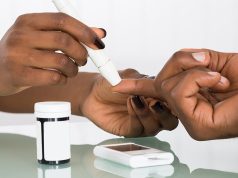Nonsignificant reduction in hypoglycemia episodes; significant improvement in hypoglycemia awareness
TUESDAY, Nov. 1, 2016 (HealthDay News) — A brief, partly web-based educational intervention, HypoAware, is beneficial for reducing severe hypoglycemic episodes and improving hypoglycemia awareness compared with usual care, according to a study published online Oct. 20 in Diabetes Care.
Stefanie M.P.A. Rondags, from the VU University Medical Center in Amsterdam, and colleagues enrolled 137 insulin-treated patients with problematic hypoglycemia in eight Dutch clinics to compare HypoAware care with usual care. The authors assessed self-reported severe hypoglycemia, impaired hypoglycemia awareness, and worries and distress about hypoglycemia at baseline and at two, four, and six months of follow-up.
The researchers found that, compared with the control group, the HypoAware group had 33 percent fewer episodes of severe hypoglycemia (relative risk [RR], 0.67; 95 percent confidence interval [CI], 0.39 to 1.16). They also had significantly reduced odds of impaired awareness (odds ratio, 0.38; 95 percent CI, 0.15 to 0.95), a trend toward fewer worries about hypoglycemia (RR, 0.80; 95 percent CI, 0.64 to 1.01), and a significant reduction in hypo-distress (RR, 0.70; 95 percent CI, 0.56 to 0.88). Participants experienced a median of 2.5 events of severe hypoglycemia in the control condition versus one event in the HypoAware event over the six-month study duration (P = 0.030).
“HypoAware resulted in fewer severe hypoglycemic episodes, significantly improved hypoglycemia awareness, and less hypo-distress in comparison with usual care, and deserves further dissemination,” the authors write.
The study was partially funded by Novo Nordisk and Agis Achmea, a Dutch health care insurer.
Full Text (subscription or payment may be required)
Copyright © 2016 HealthDay. All rights reserved.








